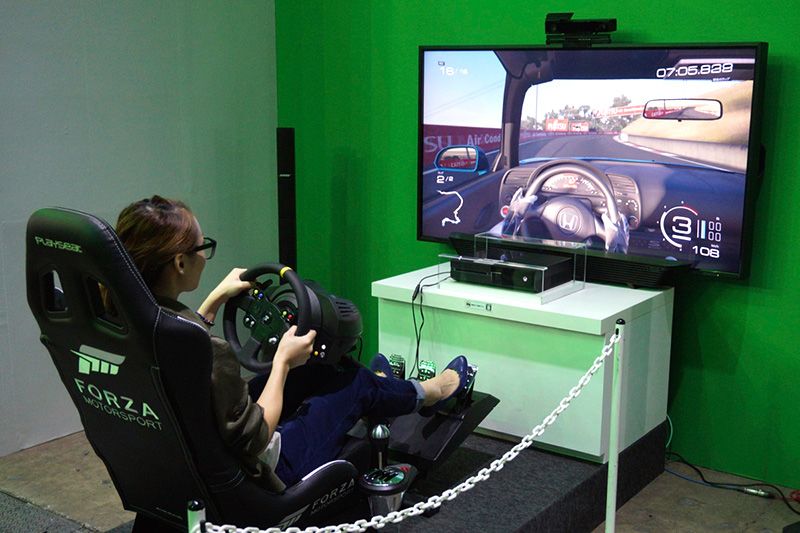
Tokyo Game Show 2014: A Last Chance for Xbox?
Culture- English
- 日本語
- 简体字
- 繁體字
- Français
- Español
- العربية
- Русский
The Japan launch of Microsoft’s Xbox One console has been met with a response that, even in the kindest terms, is underwhelming. The company was already on shaky footing in the Japanese market after its Xbox 360, the new console’s predecessor, saw flat sales following its December 2005 release. (And even this tepid welcome far outpaced the performance of the original Xbox console in Japan.)
Not helping matters was Microsoft’s failure to announce any plans it had for Japan when the Xbox One was first revealed in May 2013. The console was eventually released in Japan on September 4, 2014 (nearly 10 months after its US and European release), just two weeks prior to the Tokyo Game Show, which ran on September 18–21 at Chiba’s Makuhari Messe.
Strong Presence at the Show
Microsoft secured a large display area at TGS, where the company showed off a number of titles to the public it hopes to win over. The green-shaded swath of convention hall space seemed to draw a steady wave of foot traffic, and none of the demos were available to play without a least a little time standing in line—a positive sign for the Redmond firm, even if the players didn’t reach the numbers seen at Sony’s space.
The area did have legitimately good titles on display, such as the action game Sunset Overdrive, a reboot of the famed fighting franchise Killer Instinct, the gorgeous racer Forza Horizon 2, and about two dozen other titles.
 Forza Horizon 2 offered TGS visitors an immersive racing experience.
Forza Horizon 2 offered TGS visitors an immersive racing experience.
The show may have served as Microsoft’s delayed attempt to drum up Japanese interest in the Xbox One, seeing as how it flew largely under the radar at release.
“We aren’t offering any specific numbers on what we have sold,” Microsoft representative Isogai Naoyuki said in the Microsoft area during TGS. “We just want to earn the satisfaction of the people who buy our products and try as much as possible to make them better.”
Can Xbox Make It in Japan?
Still, the overarching reality of Microsoft’s performance in Japan remains a hindrance.
 Can fighting games like the latest Killer Instinct give Microsoft the edge its console needs?
Can fighting games like the latest Killer Instinct give Microsoft the edge its console needs?
The Japanese market has for years been dominated by domestic players Nintendo and Sony. In Japan, built-in familiarity and a level of trust go a long way toward ensuring success in many areas of business—particularly in the gaming sector, where many casual gamers and hobbyists alike flock to properties they’re familiar with. This in turn incentivizes gaming companies, especially at a smaller level, to focus on titles that reach the platforms run by one of the two big gaming giants.
Microsoft had a success on its hands with the first Xbox in the United States and followed that with the Xbox 360, which was a smash hit. That did nothing to engender much of a base in Japan, though, where the US console has been slow to gain traction.
The company has to hope for some sort of post-TGS bump in light of the reaction to Xbox One’s Japanese launch.
A September 25 report on video-game-centric website Kotaku notes that Microsoft sold 25,674 Xbox One consoles in its first two days, but only 3,015 during its second week of sales, and just 1,314 during the third week of September. (And even that initial bump, notes Kotaku, pales in comparison to the more than 60,000 Xbox 360s sold in the two days after its Japan launch in 2005.)
These numbers leave Microsoft in an uncertain place going forward. The company seemed to acquit itself well during TGS, but it remains to be seen how much impact, if any, this will have on XBox One’s dormant sales in Japan.
The company’s future in Japan is made even cloudier by its recent entry into China, where success could result in Microsoft scaling back its efforts in the Japanese market. The company has the Chinese field virtually to itself at the moment as the first major console-maker to release a system in the nation.
Virtual Reality: Something to Watch
There wasn’t much in the way of new hardware on display outside of Microsoft’s console, which was only really new to Japan and Asia. Several pieces of virtual reality tech were on show, however, as both Oculus VR’s Oculus Rift and Sony’s Project Morpheus made an appearance. Not to be outdone, Samsung also had a playable VR headset to show off, though Oculus VR and Sony are the major players at the moment.
These products each utilize a headset that goes over users’ eyes and ears to deliver a wholly immersive environment in various styles of games, each providing a different experience.
As the console wars wage on, VR tech seems to be on the horizon in some form, albeit somewhat far off in terms of affordability and reach. The Tokyo Game Show was simply the latest battleground in the race for these companies to establish a sort of brand awareness in preparation for the technology catching on (or even just the hope that it does so) in future years.
(Originally written in English on October 2, 2014.)